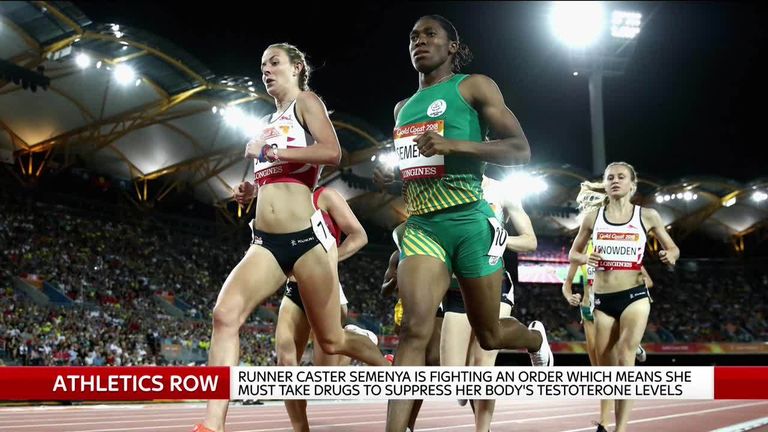'The IAAF will not drug me' - Caster Semenya appeals against testosterone ruling
The runner said: "I am a woman and I am a world-class athlete. The IAAF will not drug me or stop me from being who I am."
Wednesday 29 May 2019 20:40, UK
South African athlete Caster Semenya has filed an appeal to the Swiss supreme court against the ruling that she should take medication to lower her testosterone levels.
Her appeal will challenge the recent decision by the Court of Arbitration for Sport (CAS).
Semenya's argument that a testosterone limit should not be introduced for women with naturally-occurring high levels of the hormone by the world athletics governing body the International Association of Athletics Federations (IAAF), was rejected by CAS on 1 May.
In a statement, the runner said: "I am a woman and I am a world-class athlete. The IAAF will not drug me or stop me from being who I am."
She also expressed her thanks to those who support her efforts to "secure her right to run free".
The two-time Olympic 800-metre champion is asking the Federal Supreme Court of Switzerland to dismiss the 1 May ruling, which supports the IAAF decision to introduce testosterone limits.
Semenya's representatives say the IAAF decision supports "unnecessary and unwanted hormonal drug interventions on female athletes despite the lack of any medical protocols and the uncertain health consequences of such interventions".
The South African will also ask the court whether the IAAF's policy violates "essential and widely recognised public policy values, including the prohibition against discrimination, the right to physical integrity, the right to economic freedom, and respect for human dignity".
Her lawyer, Dr Dorothee Schramm, said: "The IAAF regulations violate the most fundamental principles of Swiss public policy. In the race for justice, human rights must win over sporting interests."
Gregory Nott, her lawyer in South Africa, said: "It is gravely concerning that the IAAF has called on doctors to 'clarify' the gender identities of female athletes and justified medical interventions on female athletes as 'gender-affirming'.
"Such views are based not in modern science or medicine. Instead, they reflect an outdated and deeply flawed socio-cultural stereotype of what it means to be a woman."
The landmark ruling earlier this month meant that Semenya would not be allowed to run in international races between 400 metres and one mile, unless she medically lowers her natural testosterone levels.
After the CAS ruling Semenya said she would not take any medication.
The runner is set to run in a 3000-metre race at the Diamond League Prefontaine Classic at the end of June - her first race since the new rulings came in to place.






